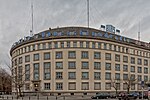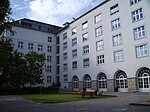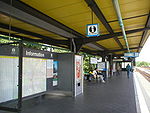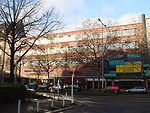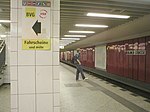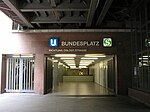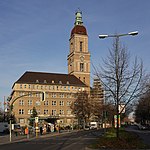"Ich bin ein Berliner" (German pronunciation: [ɪç ˈbɪn ʔaɪn bɛɐ̯ˈliːnɐ]; "I am a Berliner") is a speech by United States President John F. Kennedy given on June 26, 1963, in West Berlin. It is one of the best-known speeches of the Cold War and among the most famous anti-communist speeches.
Twenty-two months earlier, East Germany had erected the Berlin Wall to prevent mass emigration to West Berlin. The speech was aimed as much at the Soviet Union as it was at West Berliners. Another phrase in the speech was also spoken in German, "Lasst sie nach Berlin kommen" ("Let them come to Berlin"), addressed at those who claimed "we can work with the Communists", a remark at which Nikita Khrushchev scoffed only days later.
The speech is considered one of Kennedy's finest, delivered at the height of the Cold War and the New Frontier. It was a great morale boost for West Berliners, who lived in an enclave deep inside East Germany and feared a possible East German occupation.
Speaking to an audience of 120,000 on the steps of Rathaus Schöneberg, Kennedy said,
Two thousand years ago, the proudest boast was civis romanus sum ["I am a Roman citizen"]. Today, in the world of freedom, the proudest boast is "Ich bin ein Berliner!"... All free men, wherever they may live, are citizens of Berlin, and therefore, as a free man, I take pride in the words "Ich bin ein Berliner!"
Kennedy used the phrase twice in his speech, including at the end, pronouncing the sentence with his Boston accent and reading from his note "ish bin ein Bearleener", which he had written out using English orthography to approximate the German pronunciation. He also used the classical Latin pronunciation of civis romanus sum, with the c pronounced [k] and the v as [w].
For decades, competing claims about the origins of the "Ich bin ein Berliner" overshadowed the history of the speech. In 2008, historian Andreas Daum provided a comprehensive explanation, based on archival sources and interviews with contemporaries and witnesses. He highlighted the authorship of Kennedy himself and his 1962 speech in New Orleans as a precedent, and demonstrated that by straying from the prepared script in Berlin, Kennedy created the climax of an emotionally charged political performance, which became a hallmark of the Cold War epoch.There is a widespread misconception that Kennedy accidentally said he was a Berliner, a German doughnut specialty. This is an urban legend, including the belief that the audience laughed at Kennedy's use of this expression.

